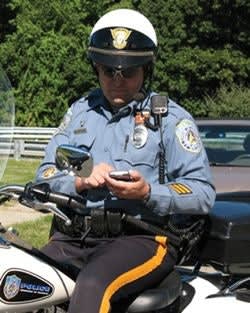In a bid to curb crime through community engagement, the Baltimore Police Department is using new wireless technology to get back to the tradition of the neighborhood cop on foot patrol.
Verizon's PocketCop solution provides individual officers with data usually accessed via in-car computer. POLICE Magazine spoke with department spokesperson Anthony Guglielmi about the reason for expanding foot patrol and how this solution is making it possible.
"The PocketCop device basically provides all the tools that you would find on a traditional police radio and in a police car on your BlackBerry," says Guglielmi, Chief of Public Affairs for Baltimore PD. "In addition it also serves as a BlackBerry – you have a telephone, camera, e-mail capability. This essentially makes the officer mobile, so he can do everything that he could do from a police car while walking on foot in the community."
Running a person's name through NCIC used to require querying the database via a mobile data terminal or waiting to get the information verbally through dispatch. Now an officer with PocketCop on his BlackBerry can immediately access not only a list of warrants for a contact, but also see a photo on screen and hold it up next to the person in front of him. This allows the officer to verify if a false name was given. This approach has proven invaluable in the field.
"Another officer interviewed someone on the street and found that he was a known sex offender that was wanted by another agency, all because the officer had the PocketCop at his disposal," says Guglielmi.
Baltimore PD officers have also used PocketCop's capabilities to take a photo of graffiti on a wall and e-mail the image to investigators immediately.
What began as a pilot program testing 80 devices is being expanded to the entire patrol division. The agency used $3.5 million of stimulus money to pay for the 2,000 devices needed to outfit every patrol officer. Some kinks still need to be worked out, such as how the state of Maryland will accommodate the increased use of broadband needed for so many officers to access NCIS and DMV databases at the same time. But Guglielmi is confident in PocketCop's success.
"The violence is becoming less and less in Baltimore, and we think it's really because of our strategy of engaging the community. And this device is going to help us engage the community even more."













